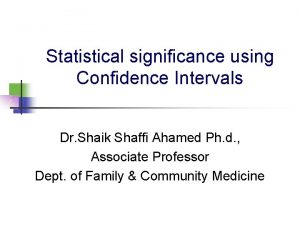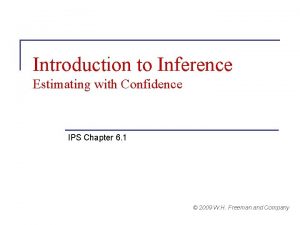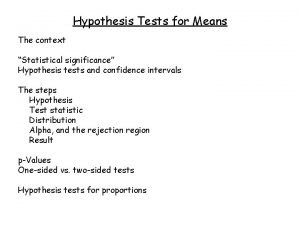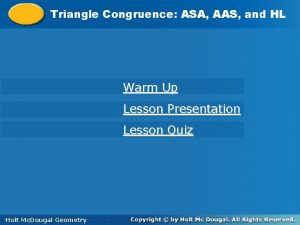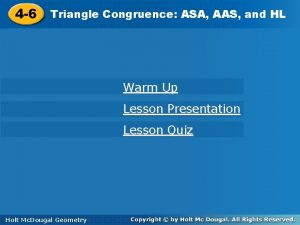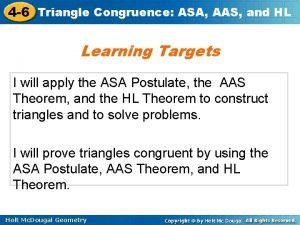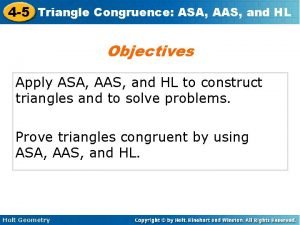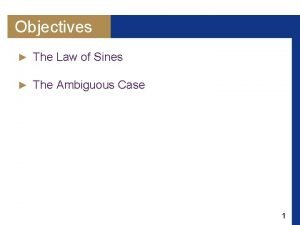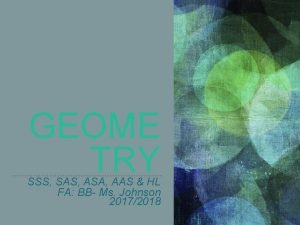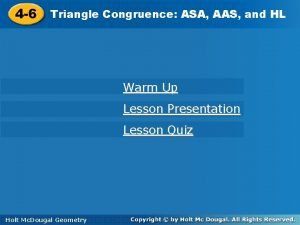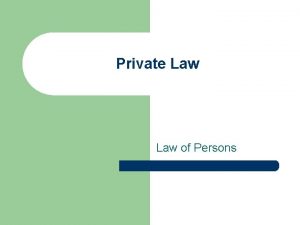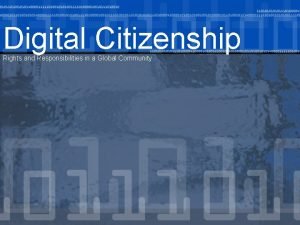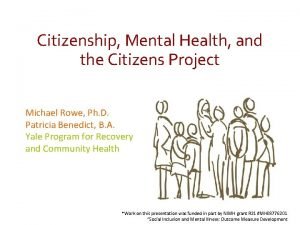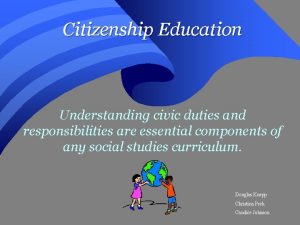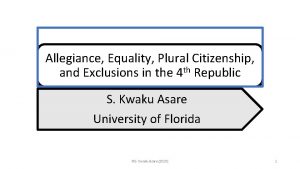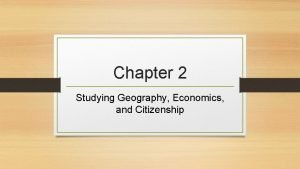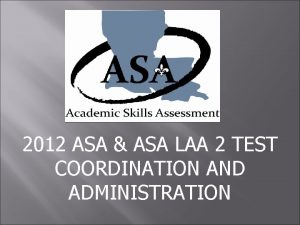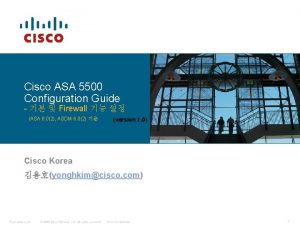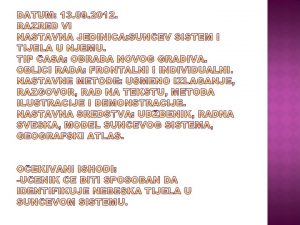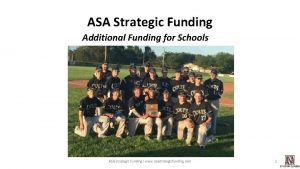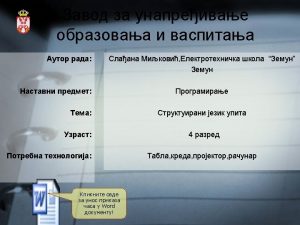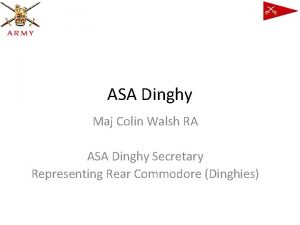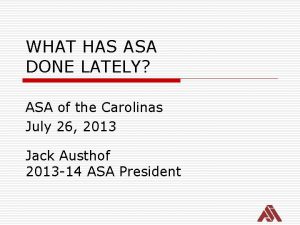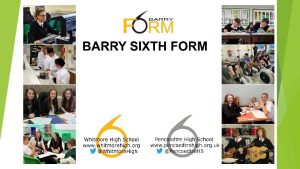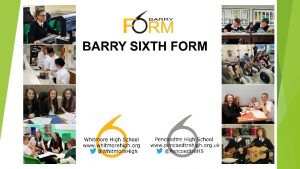Introduction to post16 citizenship and ASA level Citizenship





















- Slides: 21

Introduction to post-16 citizenship and AS/A level Citizenship Studies(AQA Specification)

Aims of the session To clarify the aims and purpose of citizenship education To raise awareness of the benefits of citizenship activities for students and their organisations To illustrate some active techniques for AQA AS/A Citizenship Studies provision To examine the relevance of citizenship in relation to other priorities and government educational initiatives

What is citizenship? Citizenship involves: • • • the investigation of topical, controversial, social and political issues, leading to young people’s responsible action to influence the issue, for the benefit of the community. It brings new knowledge and skills about our political system, and it encourages young people to form considered opinions. Citizenship enables young people to use their voice, within both their community and their learning organisation.

Citizenship is not the same as…. . Lifeskills/PSHE Citizenship looks at the public issues rather than the personal ones Volunteering or charity fund-raising Citizenship develops critical understanding as well as action Nationality Citizenship encourages existing, new and would-be citizens to get involved and take an interest in topical and controversial issues

QCDA Guidance and the three essential Post-16 citizenship should provide three essential opportunities for learning through action: • To identify, investigate and think critically about citizenship issues, problems or events of concern to them, AND • Decide on and take part in follow-up action where appropriate, AND • Reflect on, recognise and review their citizenship learning.

Is it real citizenship? Feedback Case study A: Yes, a good example where students find out about a citizenship issue and take some action Case study B: No, not as it stands. It involves no understanding of policy issues and no action to improve the situation in the future. It does show real commitment that could be built on Case study C: No, it is not citizenship, but a very worthwhile fundraising activity. If the young people found out about the social and political aspects of the disaster, it would be. Case study D: Yes, young people engage with their peers on a matter of local policy and make a report for the council Case study E: No, unless as part of the rest of the course, the students examined public policy on the care of older people, and applied this learning to the project

Mind gym • Arguer • Counter-arguer • Observer Scores One mark for a relevant point in the argument Two marks for a reason to support that point

Four principles of post-16 citizenship • Active learning • Community involvement • Youth-led action • Real, topical and controversial issues

What is active learning? • Opposite of passive learning • Learner’s own involvement in the process of gaining, and in the construction of, knowledge • Involves new experiences (doing and observing) • Involves dialogue (with self and others) • Requires interaction with others • NOT necessarily ‘physical movement’, but active brain engagement with the issues • It involves good briefing and de-briefing to clarify learning

Active learning cycle Do Active Learning Cycle Apply (futures) Processes and Skills Review (findings) Reflect (facts and feelings)

Examples Individual engagement with material Paired discussion work Small group interactions Large group exploratory activities ‘Quick thinks’ Case studies Card sorts In-trays Working to a brief Design-and-make Role play Simulation Games Investigations

Community involvement Examples of community involvement: Environmental projects Campaigns Youth forums Intergenerational activities School and college linking Events such as conferences, consultations, seminars

Community involvement: good practice • • Working with community partners is central, but there are important principles to bear in mind: – Clear purpose and timeline – Negotiated responsibilities – Health and safety/CRB checks Young people need support, while allowing them autonomy. Senior staff will need to know about the work going on • The planning stage is very important, so that students are clear about what they are trying to achieve and how • It is important to review learning and extent of success

Youth-led projects • Facilitators should support youth-led projects while not taking over • It is important to involve everyone and not just a vocal minority • Everyone should have a role and feel valued • The young people will need training in the skills required • People should work to their strengths, while also pushing themselves to try out more challenging activities (e. g. chairing meetings) • Time will be needed at the end for reflection and review • Celebrations of achievement and recognition from senior staff are important

Real, topical and controversial issues • Young people should select real issues of interest to them to investigate and take action on • Controversy should not be avoided • Students and staff need training in how to deal sensitively with controversial issues (See ‘Agree to disagree: Citizenship and controversial issues’, available from LSN)

Discussion of case studies Which of the case studies best illustrate the four key features of post-16 citizenship: Active learning Community involvement Youth-led action Real, topical and controversial issues?

The Specification at a glance AS Level Unit 1: Identity, Rights and Responsibilities Key Questions and issues What is a citizen? What does it mean to be British? How socially diverse is Britain? Are we all equal citizens? Dealing with prejudice, discrimination and disadvantage. What are my responsibilities and rights, and how are they supported?

AS Level Unit 2: Democracy, Active Citizenship and Participation Key Questions and issues Who can make a difference? Who holds power in the UK? The citizen and political power. How can I make a difference? Getting involved and working together to bring about change; becoming an informed, participating and active citizen.

A Level Unit 3: Power and Justice Key Questions and issues What is crime? The roles of the police and the Crown Prosecution Service. What is justice? Judicial processes. Who speaks on our behalf? Elections, representatives and citizens. How is the UK governed?

A Level Unit 4: Global Issues and Making a Difference Key Questions and issues Global Citizenship: universal human rights; conflict and it’s resolution; trade and environmental issues. Active Citizenship: individuals and groups that make a difference (study of a pre-released topic)

Action planning Discuss: Which approaches could we try here? What support would we need? What obstacles might we meet?
 Significance and confidence level
Significance and confidence level What is the interpretation of a 96 confidence level
What is the interpretation of a 96 confidence level Confidence level and significance level
Confidence level and significance level Dfd level 0 and level 1
Dfd level 0 and level 1 Asa and aas difference
Asa and aas difference 4-6 triangle congruence asa aas and hl answers
4-6 triangle congruence asa aas and hl answers Can you use the sss postulate or the sas postulate to prove
Can you use the sss postulate or the sas postulate to prove 4-6 triangle congruence asa aas and hl answers
4-6 triangle congruence asa aas and hl answers Aas example
Aas example Triangle congruence asa and aas
Triangle congruence asa and aas Lesson 3 triangle congruence by asa and aas
Lesson 3 triangle congruence by asa and aas If abc and gef are congruent by the asa criterion
If abc and gef are congruent by the asa criterion Asa role and purpose
Asa role and purpose Ambiguous triangle
Ambiguous triangle Sss sas asa aas hl
Sss sas asa aas hl 4-6 triangle congruence asa aas and hl answers
4-6 triangle congruence asa aas and hl answers Nationality and citizenship difference
Nationality and citizenship difference Rights and responsibilities of digital citizenship
Rights and responsibilities of digital citizenship Mental health and citizenship
Mental health and citizenship Civic citizen
Civic citizen Citizen plural
Citizen plural Studying geography economics and citizenship
Studying geography economics and citizenship
